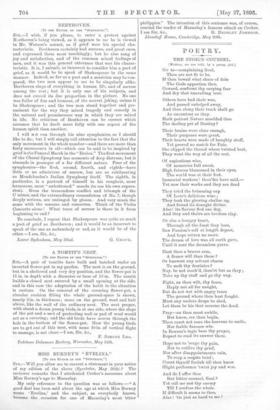BEETHOVEN.
[To THE EDITOE OP TICE "SrEcTiaolt."1 wish, if you please, to enter a protest against Baethoven's being viewed, as it appears to me he is viewed in Mr. Watson's sonnet, as if grief were his special cha- racteristic. Beethoven certainly had sorrows, and great ones, and expressed them most touchingly; but he also sang of joy and satisfaction, and of the common mixed feelings of men, and it was this general utterance that was his charac- teristic. It is, I submit, as incorrect to consider him a poet of grief, as it would be to speak of Shakespeare in the same manner. Indeed, so far as a poet and a musician may be con- pared, the two men appear to me to be singularly alike. Beethoven sings of everything in human life, and of sorrow among the rest ; but it is only one of his subjects, and does not exceed its due proportion in the picture. No one was fuller of fun and humour, of the merest joking, unless it be Shakespeare ; and the two men stand together and pre- eminent for the way they mixed tragedy and comedy in the natural and promiscuous way in which they are mixed in life. No criticism of Beethoven can be correct which assumes that he dealt more fully with one aspect of the human spirit than another.
I will rot run through his nine symphonies, as I should like to do ; but I will simply call attention to the fact that the only movement in the whole number—and there are more than forty movements in all—which can be said to be inspired by grief is the Funeral March in the "Eroica." The first movement of the Choral Symphony has moments of deep distress; but it abounds in passages of a far different nature. Four of the symphonies—the first, second, fourth, and eighth—have little or no admixture of sorrow, but are as exhilarating as lifendelssolin's Italian Symphony itself. The eighth, in particular, is a portrait of himself in his roughest, most humorous, most "unbuttoned" moods (to use his own expres- sion). Even the tremendous conflict and triumph of the C minor, and the extraordinary romanticism of No. 7, though deeply serious, are untinged by gloom. And very much the same with the sonatas and concertos. Think of the Violin Concerto alone ! What trace of sorrow is there in it from beginning to end ?
To conclude, I repeat that Shakespeare was quite as much a poet of grief as Beethoven; and it would be as incorrect to speak of the one as melancholy or sad, as it would be of the other.—I am, Sir, &c., Lower Sydenham, May 22nd. G. GROVE.


































 Previous page
Previous page